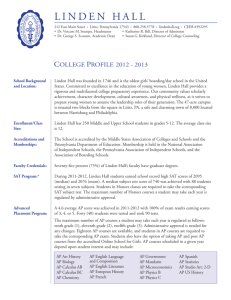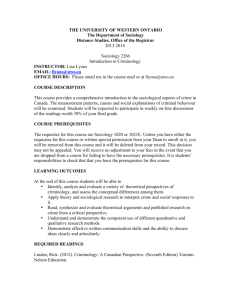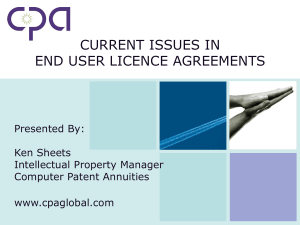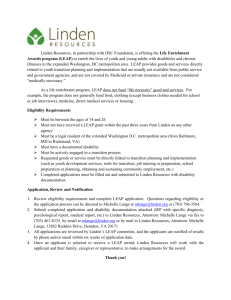Virtual IP and beyond
advertisement
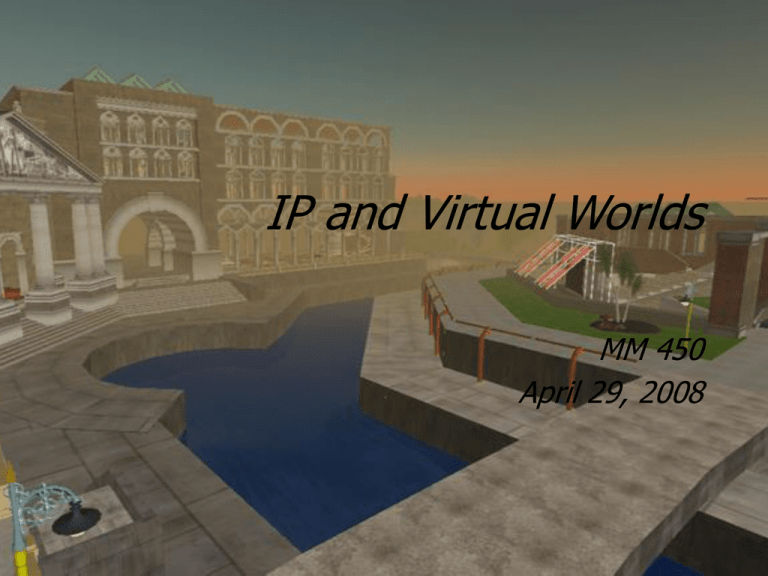
IP and Virtual Worlds MM 450 April 29, 2008 nothing has changed, everything has changed oh gosh, not again All laws are in place and best as we can tell, apply. There are cases that indicate as much. Jurisdictional issues are as complex as IP law, globalism, and the internet can make them. IP law is hardly the tip of the iceberg. Ownership of every aspect and behaviors of every kind, not just IP law issues, are at play and risk. What one "owns," "uses," and "does" in virtual spaces are all at issue. If IP law is behind (new media), IP law in virtual environments is even “behinder.” There are lawyers beginning to specialize in this phase of IP law. There are content holders with interests. There have been and will be cases. Jurisdiction:0k, so whose law applies? Sigh. Traditional jurisdiction analysis applies; and in a global and netted environment, clarity is not present. ICANN, and other such bodies have shown that SOME international disputes can be moderated by extra-legal entities But who and what would get, potentially, hundreds of virtual world owners to agree to outside control, by whom? The software is proprietary and very much of what controls is contract law: Click wrap and shrink wrap agreements and terms of service (TOS) trump a lot of IP law. We’ve seen how user agreements can modify other rights. Will open source take out TOS/contract aspect and revert everything to in-place IP law? VWs have community agreements and sometimes even enforcement mechanisms. These are extra legal, but suffice for many resident disputes. However, not for all. And they are outside the legal system so may not protect user rights properly. But, old media operated this way for years; and the internet still does, in some ways. Some sources for background on these issues: Anne Wells Branscomb (ed.) Journal of Computer-Mediated Communication: “Emerging Law on the Electronic Frontier” Volume 2, Number 1: Part 1 of a Special Issue June, 1996. Especially: Part One: http://jcmc.indiana.edu/vol2/issue1/index.html David R. Johnson, Due Process and Cyberjurisdiction. Tamir Maltz, Customary Law & Power in Internet Communities. Juliet M. Oberding, A Separate Jurisdiction For Cyberspace? Part Two: http://jcmc.indiana.edu/vol2/issue2/index.html Niva Elkin-Koren, Public/Private and Copyright Reform in Cyberspace. Post, David G., and David R. Johnson, (2006). "The Great Debate--Law in Virtual World." First Monday. 11 (2) http://www.firstmonday.org/issues/issue11_2/post/index.h tml Buffer/Ram “copies” and reproduction rights As we just saw in 20th Century Fox v.Cablevision, if buffer copies are "fixed," then they fall within the reproduction rights of copyright holders and implicate every sort of distribution of material. This is especially crucial in many virtual environments where GOBS of what one sees/gets is held in cache on each users’ machine. A re-interpretation of this aspect (from "buffer doesn't count" to "everything in RAM is a copy") would take us back to the most draconian interpretation of the Green and White Papers before the final drafting of the DMCA and would put EVERYthing up for grabs, both about ownership AND about terms of use (pay for click). First Sale Doctrine and transmission Principles in the First Sale Doctrine have been deeply curtained by digital technologies. After purchase, the law enables one to do about whatever one wants with an analog media item. Digital changes that as further transmission constitutes dissemination/performance, controlled by the Copyright Act and DMCA. This is a crucial feature in virtual worlds as all aspects are (to one degree or another) easily reproducible, but constitute “everything” there is. Let’s examine many of the issues via a look at Second Life as example BTW: SL is an archetype because It consists, primarily, of user-created content; It’s neither quest, violence, nor level based, so is less a game than on online environment; It is exceedingly proprietary--at this point, it uses neither a distributed computing model nor is it open-source (though both are possible down the road); It has numerous policies specifically oriented toward IP questions; There is a developing set of cases/incidents. Notwithstanding their good feelings and helpful policies, they own it all Via their TOS <http://secondlife.com/corporate/tos.php>, they note that they own it all (not only the goods, but the account and your data) and that they grant use to qualified users. 3.3 Linden Lab retains ownership of the account and related data, regardless of intellectual property rights you may have in content you create or otherwise own. You agree that even though you may retain certain copyright or other intellectual property rights with respect to Content you create while using the Service, you do not own the account you use to access the Service, nor do you own any data Linden Lab stores on Linden Lab servers (including without limitation any data representing or embodying any or all of your Content). Your intellectual property rights do not confer any rights of access to the Service or any rights to data stored by or on behalf of Linden Lab. 3.4 Linden Lab licenses its textures and environmental content to you for your use in creating content in-world. During any period in which your Account is active and in good standing, Linden Lab gives you permission to create still and/or moving media, for use only within the virtual world environment of the Service ("in-world"), which use or include the "textures" and/or "environmental content" that are both (a) created or owned by Linden Lab and (b) displayed by Linden Lab in-world. Copyright policies seem helpful to users Via the TOS, they allow some rights back to users; yet they limit other rights. They grant back full copyrights, except they retain full rights to use everything in any way they want. Mostly, they refer to their needs to use stuff for promotion (otherwise, they’d have to ask for permission every time they did anything in support of SL. Since it’s almost all user created, they’d be pretty tied up). They retain full rights to repurpose the content for their purposes. 3.2 You retain copyright and other intellectual property rights with respect to Content you create in Second Life, to the extent that you have such rights under applicable law. However, you must make certain representations and warranties, and provide certain license rights, forbearances and indemnification, to Linden Lab and to other users of Second Life. They also give residents advice as to how to protect their copyrights<http://blog.secondlife.com/2008/04/11/protectin g-your-copyrighted-content/> And provide full instructions about the DMCA notification and takedown process <http://secondlife.com/corporate/dmca.php> They abrogate all patent rights and claims (at least within SL) You also understand and agree that by submitting your Content to any area of the Service, you automatically grant (or you warrant that the owner of such Content has expressly granted) to Linden Lab and to all other users of the Service a non-exclusive, worldwide, fully paid-up, transferable, irrevocable, royalty-free and perpetual License, under any and all patent rights you may have or obtain with respect to your Content, to use your Content for all purposes within the Service. You further agree that you will not make any claims against Linden Lab or against other users of the Service based on any allegations that any activities by either of the foregoing within the Service infringe your (or anyone else's) patent rights. Why? They philosophically oppose software patents that, in their view, stifle innovation. They prefer “patent peace,” where everyone gets to use the innovations. https://support.secondlife.com/ics/support/default.asp?deptID=4417 (then click “legal questions/More info about Section 3.2 of the ToS and patents) What’s the problem? This illustrates how proprietary stuff can change the legal playing field through TOS/contracts. Citizen’s rights often get trumped in the fine print. Happens all the time in proprietary CMS (like BlackBoard) that compromise educational activities. A central issue in the new media/digital environment. We’ve seen that IP courts haven’t kept up; contract law is even further behind. I wonder how many judges or lawyers read the TOS for every website they visit? Each has one. Ignorance is no protection from the law. . . Yada yada. In some ways the digital revolution may, in the long run, be even more “bound up” by these contract issues than by trouble over IP law itself. LL recently put in a HUGE program over their trademarks In effect, “everyone” was using almost all their marks, in most cases, without permission. They “pulled the who practice back” by invoking their rights and introducing policies and programs for “proper” usage. http://secondlife.com/corporate/brand/trademark/index.php Certainly the right thing to do, for them. But also illustrates how proprietary software, and the virtual worlds they create, are at the behest of the owners/operators--who can change/fine tune the rules at any time. Streaming technologies are not really very secure: To whit-- Copybot [the] libsecondlife project consists of a loose group of programmers that all have the common goal of making an open source interface library for Second Life. . . Some are hoping that once libsl is mature enough, it will even allow the development of open source sims that can be hosted outside of Linden Labs, and allow the official SL client to seamlessly connect from the Main Grid to these alternative sims using a relatively simple proxy on the client machines. The project was fully sanctioned by SL/LL. In the pursuit of these varied goals, one of the things that libsl needs to be able to do is fully decode the packets from SL that describe prims, textures, inventories and all the assets. It also needs to be able to, as the official client does, enable the creation of all of those. Somebody leaked, a youtube video of it in use was made, a copy of the code that linked decoding and creating was submitted to our publicly accessible source code repository, and someone outside of the team grabbed it, packaged it, and started distributing…and the copybot incident was “on” and out of hand. Streaming technologies are not really secure: Copybot There is no way to prevent this type of activity. If the official SL client is able to display data for a particular account, then a bot logged in as that account will be able to retrieve and use that data. Use of encryption or similar will not work, because the official SL client must have a means of decrypting it, and if the official client can decode it -- then that method can be reverse engineered out of it. Although copybot itself cannot make perfect copies of prims & textures, that's more of a function of that fact that work on that particular areas of SL had not started before November 2006. It is within the realm of possibility, that *ALL* content that a particular account can access can be decoded, stored off-line, and recreated. Including scripts, full downloads of textures, prim data, appearances, the terrain/land/parcel data for a sim, *ANYTHING* that you can make or upload using the official client -- if your account has permissions to get information on it, then a bot could be made to download and recreate it. This in fact is the goal of more then one member of the libsecondlife project. Michael Cortez, AKA Static Sprocket, email Nov. 17, 2006 to Second Life Educators listserve (SLED). LL claims ISP safe harbor status and, on the one hand, opts out of responsibility for protecting users’ stuff. 1.2 Linden Lab is a service provider, which means, among other things, that Linden Lab does not control various aspects of the Service. You acknowledge that Linden Lab is a service provider that may allow people to interact online regarding topics and content chosen by users of the service, and that users can alter the service environment on a real-time basis. Linden Lab generally does not regulate the content of communications between users or users' interactions with the Service. As a result, Linden Lab has very limited control, if any, over the quality, safety, morality, legality, truthfulness or accuracy of various aspects of the Service. Though TOS “rules,” they maintain “community standards” for behavior and enforce both TOS and CS. But LL uses the TOS and Community Standards as justifications for taking actions in relation to users The Community Standards sets out six behaviors, the "Big Six", that will result in suspension or, with repeated violations, expulsion from the Second Life Community. http://secondlife.com/corporate/cs.php Welcome to Second Life! The following agreement (this "Agreement" or the "Terms of Service") describes the terms on which Linden Research, Inc. ("Linden Lab") offers you access to its services. This offer is conditioned on your agreement to all of the terms and conditions contained in the Terms of Service, including your compliance with the policies and terms linked to (by way of the provided URLs) from this Agreement. By using Second Life, you agree to these Terms of Service. If you do not so agree, you should decline this agreement, in which case you are prohibited from accessing or using Second Life. http://secondlife.com/corporate/tos.php Some cases: Beginning to test this stuff Bragg vs. Linden Lab (2006-2007) http://secondlife.typepad.com/second_life_lawsuit_bragg/second_life_lawsuit_pleading s_with_the_court/index.html In which LL tossed Mr. Bragg and confiscated his virtual stuff for an alleged violation of TOS. Mr. Bragg had found a way to leverage land sale auctions in SL to his advantage (isn’t that what gamers do? Look for exploits toward more points?--but of course, in this case, Lindens are negotiable currency). His virtual property was taken/revoked, at estimate of about 5G. Bragg used the TOS to claim that (a) it said the stuff was his and (b) LL’s inworld adjudication procedures were inadequate. Filed in PA state court (10/4/06), moved to Federal court judge in PA. (Robreno) (11/7/06). Robreno ruled (5/30/07) in favor of Bragg, virtually invalidated the TOS as legally binding, and agreed that the LL procedures were inadequate. http://secondlife.reuters.com/stories/2007/05/31/judge-rules-against-one-sidedtos-in-bragg-lawsuit/ He defined the TOS as an unenforceable “contract of adhesion,” so allowed the case (Braggs’ claim that the TOS gave HIM ownership of his virtual stuff) to go forward (LL had asked for dismissal). This ruling MIGHT invalidate virtually all similar shrink/click wrap contracts He repeated his ruling on a second action (an LL motion to compel arbitration). After which LL settled with Bragg (undisclosed terms) and changed it’s TOS to refine ownership claims… making clear that THEY OWN EVERYTHING. Eros, LLC et al v. Simon et al.: “Rase Kenzo” case Six Major Second Life Content Creators Sue Alleged Copyright Infringer in NY Federal District Court http://virtuallyblind.com/2007/10/27/content-creators-sue-rase-kenzo/ Six major Second Life content creators have filed a lawsuit in the Eastern District of New York claiming copyright and trademark infringement against Second Life user Thomas Simon of New York, who allegedly exploited a flaw in the Second Life software to duplicate thousands of copies of the creators’ products. Simon settled for about $600.00 (he initially turned down on offered settlement that would have cost 10X that much). http://www.patentarcade.com/2008/04/case-eros-v-simon-settled-2007-second.html Eros LLC v John Doe: further adventures of the Sex Gen Bed (July, 07)In “Eros LLC vs John Doe,” filed in the U.S. District Court in Tampa, Alderman accuses Catteneo (SL name) of illicitly copying and selling the SexGen bed for as little as L$4,000, sharply cutting into Eros’ sales. In September 6, 2007 a motion to subpoena AT&T and Charter Communications for the RL identity of Catteneo was granted. Alderman made similar requests of LL and PayPal. A default judgment was entered against Leatherwood by the District Court for the Middle District of Florida as he denied being Catteneo and did not “show” for hearings. By March, 2008, 19 year old Texan Robert Leatherwood (who had earlier denied being Catteneo) admitted owning the account and settled with Eros, terms not announced, but thought to be agreement to C&D.
